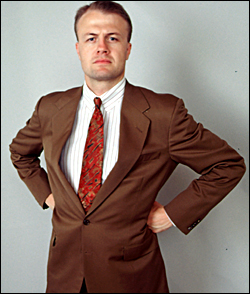TIM EYMAN HUNG UP on me. As soon as I identified myself, he thanked me for calling and hung up the phone. That is strange behavior from the state tax-cutting-initiative king, who has spent the past four years hogging the media spotlight. Eyman is a motormouth who usually can’t stop talking about his crusade to roll back taxes and shrink government. So what is making him suddenly reticent? His opponents point to a trio of terrible trials: the difficulty of delivering on his threatened “voter veto” of $4.1 billion in new transportation taxes; fund-raising woes for his latest tax-limiting initiative, I-807; and a state Public Disclosure Commission (PDC) investigation into his latest personal appeal for money for his legal-defense fund.
On Thursday, May 22, the PDC launched its latest inquiry into Eyman’s fund-raising. Last year, Eyman was caught lying about receiving money for his political work and violating campaign law by failing to disclose those earnings. As a result, he paid a $42,000 fine and agreed he would never control a campaign’s finances again.
That experience appears to be haunting him as his latest personal appeal for money comes under scrutiny. On May 19, after reading a story in the Seattle Post-Intelligencer, activist Steve Zemke filed a formal complaint with the PDC over Eyman’s fund-raising letter for his legal defense. While Zemke had no evidence of wrongdoing, he noted Eyman’s letter was full of political rhetoric but sketchy on the legal details. Evidently, Zemke hit a nerve. The PDC’s assistant director, Susan Harris, says the watchdog agency must “verify for ourselves” that none of the money raised for legal defense is going for Eyman’s living expenses.”
Eyman responded to the PDC action with an e-mail accusing the government of persecution for political reasons. “[T]he PDC is saying that following their rules has gotten me into trouble again,” he wrote. “Government’s message to Tim Eyman is clearyou’re way too effective at protecting taxpayers.”
Says Christian Sinderman, a political consultant and Eyman opponent: “It’s springtime. Tim Eyman must be laundering money.” He adds, Eyman “sure is acting guilty.”
Presumably, the case would be open and shut if Eyman had been raising money and spending it for legal defense. He could simply supply the PDC with deposit records from supporters and invoices from and payments to his lawyers. The PDC’s Harris won’t comment on any details regarding the case but says she hopes to wrap it up in 90 days.
COMPLICATING EYMAN’S life further, Gov. Gary Locke signed a bill providing $4.1 billionthe first new state money in 13 yearsfor highways, ferries, and public transportation. Most of the funds would be raised from a 5-cent increase in the gas tax. The same day, Monday, May 19, Eyman sent an e-mail to his supporters saying, “One way or the other, we’re going to give the voters the chance to get their money back.”
It seems highly unlikely that Eyman can stop the transportation taxes, however. They will go into effect July 1, and the state will start spending hundreds of millions of dollars of the money this summer, according to state Sen. Jim Horn, R-Mercer Island, one of the plan’s chief architects.
Eyman has two options to fight the new taxes. One is through a referenduma ballot measure that allows an existing law to be overturned by a vote of the people. Referenda require around 100,000 voters’ signatures on petitions 90 days after the bill is signed. The referendum would then appear on November’s ballot. Every day that passes makes this herculean task more difficult, and Eyman has, as yet, made no move.
EYMAN’S OTHER OPTION is to introduce an initiativea ballot measure that creates a new law through a vote of the peoplethat repeals the taxes. The advantage to the initiative approach is that while Eyman would have to collect nearly twice as many signaturesaround 200,000he could take until July 2004 to do so. The disadvantage is that the vote would not be until November 2004, so the state would have two road-building seasons during which to spend hundreds of millions of dollars. More importantly from a legal standpoint, the state would have plenty of time to sell bonds and pledge the new taxes to pay them off. Once bond contracts are signed, the courts will likely protect the taxes against any repeal by initiative.
In contrast, Eyman’s official entry in this year’s initiative sweepstakes is I-807, a complicated tax-limitation measure that isn’t gaining much traction, says Sinderman. He points to the relatively poor fund-raising by the measure’s backers as evidence. I-807 would require a two-thirds vote by the Legislature to increase any taxes or fees, instead of the current threshold of a simple majority.
Even I-807 supporters like King County Council member Rob McKenna, R-Bellevue, say that qualifying the measure for the ballot is a lot more challenging than previous Eyman initiatives. “It doesn’t put money in people’s pockets,” he notes.
Supporters aren’t putting as much money in Eyman’s pockets, either. His fund-raising has steadily declined over the past two years. By April 30, 2001, he had raised $413,323 for Initiative 747, a measure that limited property taxes. By April 30, 2002, only $241,441 had flowed into his coffers for Initiative 776, which slashed the cost of car tabs. By last April 30, his fund-raising was lower again$189,763 for I-807.
Since he has spent over $129,000 just to launch I-807, unless his fund-raising picks up, he will not have the funds necessary to pay signature gatherers. Typically, Eyman spends around $150,000 on signatures to qualify an initiative, according to Sinderman.
It’s hard to imagine how Eyman can experience a steep decline in fund-raising and still qualify a marginal measure for the ballot. Sinderman says Eyman “is in rough shape. People are getting sick of him because he’s sleazy.” Underestimating Eyman, however, has proven dangerous in the past. Despite his public pratfalls and legal defeats, Eyman keeps winning where it countsat the ballot box.








